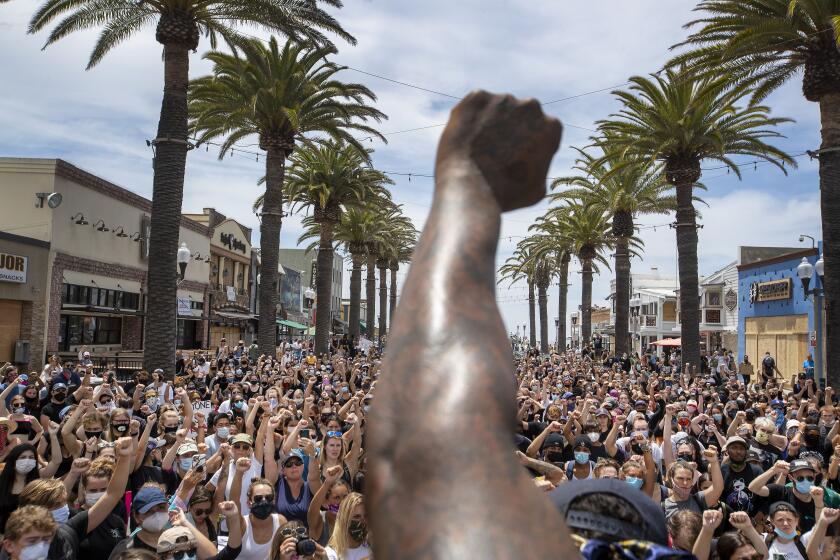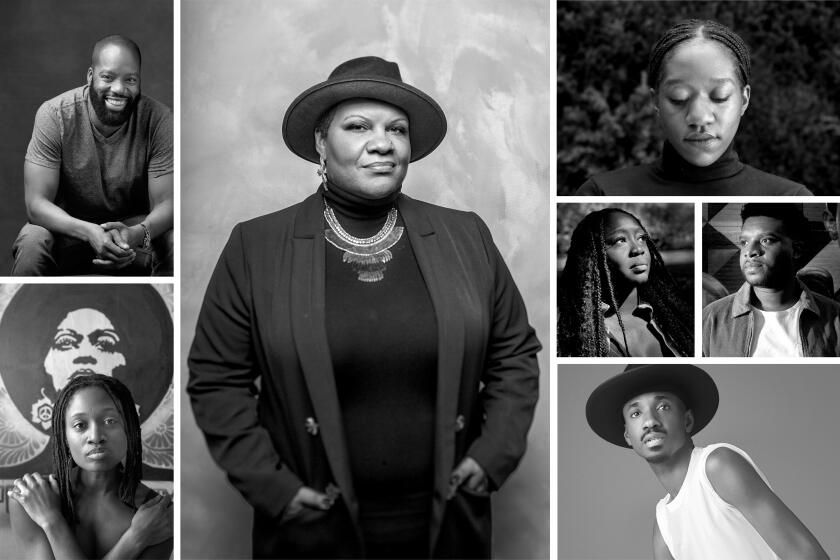Malcolm X’s full story will never be told. These biographies explain why
On the Shelf
The Dead Are Arising: The Life of Malcolm X
By Les and Tamara Payne
Liveright: 640 pages, $35
If you buy books linked on our site, The Times may earn a commission from Bookshop.org, whose fees support independent bookstores.
“The Autobiography of Malcolm X,” published shortly after the Black nationalist leader’s 1965 assassination, was both a literary classic and the foundation of his posthumous public image. But that’s been changing in the 21st century. This month, for the second time in a decade, a new biography strips away some of the mythmaking to bring a more nuanced Malcolm to the public.
The latest book, like the activist’s reputation, has been long in the making. The project that became “The Dead Are Arising: The Life of Malcolm X” was begun in 1990 by journalist Les Payne; after he died in 2018, the final edits were overseen by his daughter and lead researcher, Tamara Payne.
Already a National Book Award finalist, the book will naturally draw comparisons to Manning Marable’s 2011 Pulitzer Prize-winning biography, “Malcolm X: A Life of Reinvention.”
Marable’s was the first major work to fully re-examine Malcolm’s life in the context of his era — and to depart sharply from the “Autobiography.” The Payne book is similar in some respects, but Tamara Payne emphasizes the divergences: “My father was a journalist and Marable was a historian, so they’re different disciplines,” she says, meaning her book relied more on fresh interviews and less on interpretation. Her father embarked on the work after interviewing Malcolm’s brothers Philbert and Wilfred.
Walter Mosley, Luis Rodriguez, the coiner of #BlackLivesMatter and others sketch a hopeful future for L.A. and the U.S. after George Floyd protests.
Perceptions of Malcolm change with each generation: His death inspired radicalism in everyone from Martin Luther King to the Black Panther Party, even as he was sidelined by the white mainstream; in the ’90s, rap artists and Spike Lee reinvented him as a Che-style rebel poster-child; 20 years later he was Marable’s compelling but flawed messenger. And today, with rising white supremacy countered by Black Lives Matter, Malcolm is returning to prominence as a piece of the great puzzle of the movement: where we go next.
Every take on Malcolm, however, measures itself against the image consciously engineered by Malcolm himself in his — one that he knew he might not live to see.
“[Malcolm] engaged with the media to create the public image,” says Morgan State University professor Jared Ball. “He didn’t believe he’d survive and wanted the book to be something that would endure.”
His effort to reverse the narrative was an immediate success, said Zaheer Ali, a scholar who was Marable’s lead researcher, in an email interview: “Media publications that had belittled Malcolm in unkind obituaries just after his death published rave reviews praising the book and inviting reassessments of his life.”
There were, however, complications. For starters, the book set his legacy in stone at a time when his beliefs were shifting like sand. Initially a platform for the Nation of Islam, the autobiography evolved radically after Malcolm’s split with the group — a shift amplified by his writer, integrationist moderate Alex Haley, after Malcolm’s murder.
Against his late partner’s wishes, Haley made numerous changes. He cut one chapter, called “The Negro” (only recently made public), which would have given us “a better sense of where Malcolm felt the movement should be going,” says Bill Fletcher, former president of the TransAfrica Forum. Written while Malcolm was still in the NOI, the chapter preached self-determination and chastised integrationist activists for allowing whites to dictate terms of societal success; it also urged Black people to take political action by voting as a bloc at a time when the NOI was publicly apolitical.
Jon Meacham’s “His Truth Is Marching On: John Lewis and the Power of Hope” honors Lewis’ resistance but leaves out the hard work that got us here.
“With his assassination, Malcolm lost control over what compromises he would have been willing to make in the end,” says Peniel Joseph, author of the new book, “The Sword and the Shield: The Revolutionary Lives of Malcolm X and Martin Luther King Jr.”
And yet, as Ball says, “the autobiography, with all of its flaws, remains the defining document.”
Scholarship slowed as Malcolm’s profile faded in the ’70s and ’80s, with the notable exception of Peter Goldman’s “The Death and Life of Malcolm X” in 1973, which Ali calls “a foundational text.”
In the late ’80s, hip-hop (most notably Public Enemy) revived him in samples, and a new generation began buying Malcolm posters and wearing Malcolm shirts. But “they only resuscitated part of Malcolm,” Fletcher says. “It was like science fiction where a person was brought back from the dead but not exactly as what they were before they died. You have snippets from Malcolm’s life and images rather than a coherent picture.”
Bruce Perry’s 1991 book “Malcolm: The Life of a Man Who Changed Black America” attempted to fill the picture in — refuting parts of the autobiography while sketching Malcolm as a tormented soul driven more by inner turmoil than genuine beliefs. Perry did hundreds of interviews, but his book was attacked as a “hatchet job,” riddled with dubious claims about Malcolm’s supposed homosexuality and the idea that he firebombed his own home.
Other texts during this revival included a well-received book by Michael Eric Dyson and a PBS documentary, but Spike Lee’s 1992 movie “Malcolm X” overshadowed them all.
The scholars I spoke with agreed that the movie lacks nuance and badly shortchanges Malcolm’s late political evolution, but most credit its visceral power for introducing Malcolm to new generations. And yet it wasn’t really a revision; it relied largely on “The Autobiography.”
Times critics Justin Chang and Glenn Whipp discuss why Spike Lee’s 1989 film “Do the Right Thing” is one of the great summer movies.
It took nearly two decades for a sweeping re-examination of Malcolm’s origin story. Marable’s comprehensive retelling — Ali says it was the first to make use of his travel diaries — repeatedly debunked the “Autobiography” and shed new light on numerous incidents, including Malcolm’s assassination.
Contemporary Black academics like Dyson, Henry Louis Gates and Cornel West endorsed Marable’s interpretations. But radical activists attacked his version as too palatably mainstream. Jared Ball, who edited “A Lie of Reinvention: Correcting Manning Marable’s Malcolm X,” says the historian watered down Malcolm’s anti-capitalism and pan-Africanism. (Marable died days before his book’s publication.)
Even Fletcher, one of Marable’s closest friends, acknowledges that the epilogue — which imagines Malcolm’s future had he lived — was a mistake. “Such speculation is fine over a glass of Jack Daniel’s, but it’s not particularly useful in a scholarly book.”
Marable also made some salacious claims — that Malcolm slept with men for pay; that his split with Elijah Muhammad stemmed from a love triangle; that both Malcolm and his wife, Betty Shabazz, had affairs and that Malcolm’s included one with an 18-year-old girl the night before he died. Unsurprisingly, the true believers were furious, dismissing these mostly as unsubstantiated tabloid gossip.
“Marable presents a very complicated person with complicated relationships,” says Fletcher in his defense, pointing out that these entanglements had huge implications. Shabazz may have been sleeping with an undercover agent; the 18-year-old was, Marable claimed, linked to Malcolm’s killers. Fletcher believes the love triangle explains “why he did things that were overly provocative, putting himself in real danger.”
That’s fair game if those statements were irrefutably true. But these assertions were among the worst sourced sections of the book, riddled with qualifiers; some intimations have either no clear sources or unreliable ones like Louis Farrakhan, a Malcolm enemy.
Reached for comment, editors Wendy Wolf and Kevin Doughten would not address accuracy or sourcing. But in an email statement, they responded: “Manning was clear-eyed in his approach to the different views people have held of Malcolm for decades. He knew the backlash was coming and welcomed it — he wrote with the confidence of deep research and long experience and was looking forward to the conversations.”
The Paynes’ book arrives in a different time, amid a new resurgence — as Black Lives Matter activists, working alongside and also apart from white liberals, aim to maintain pressure for substantive changes. Malcolm is a major character in the 2019 Epix series “Godfather of Harlem” and the upcoming film “One Night in Miami.” This year, in addition to Joseph’s book, about how Malcolm and Martin Luther King had begun to converge, there was an acclaimed Netflix documentary series, “Who Killed Malcolm X.”
“The Dead Are Arising” offers only a partial corrective to earlier works, an incremental turn in the long-evolving story of one of history’s most visible and confounding activists. Payne frequently revises or expands the historical record, offering the most detailed new account of Malcolm’s early years; the clearest argument yet (with new sources) that Earl Little, Malcolm’s father, died in an accident and not in a racist murder; the revelation that Shorty (the friend played by Spike Lee in the movie) is actually a composite; a deep dive into Malcolm’s ill-advised meeting with the Ku Klux Klan; and intriguing specifics on the assassination and its aftermath.
Radha Blank’s ‘Forty-Year-Old Version’ on Netflix highlights racism in the theater industry. We asked 40 Black theatermakers for their stories.
But the Paynes don’t touch Malcolm’s intimacies or examine his legacy. The book sometimes feels incomplete, leaving out crucial moments. Tamara Payne says they avoided speculation on sexuality, explicit corrections of earlier work and certain well-known stories for several reasons. “If you can’t get it corroborated as accurate, you don’t have it,” she says. “Also the book would be 1,000 pages otherwise ... it’s already longer than my father wanted.”
Ultimately, the scholars agree that there’s no such thing as a definitive biography, especially with more information still to be discovered and analyzed. But they hope that in this new era of racial reckoning, Malcolm’s story and his ideas remain front and center. “People should view the ‘Autobiography’ and his speeches as the starting point,” Payne says, “and go from there.”
More to Read
Sign up for our Book Club newsletter
Get the latest news, events and more from the Los Angeles Times Book Club, and help us get L.A. reading and talking.
You may occasionally receive promotional content from the Los Angeles Times.











